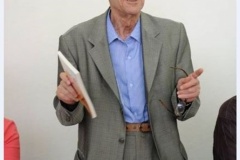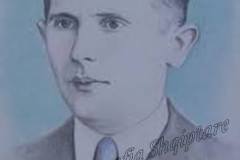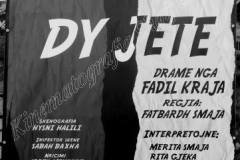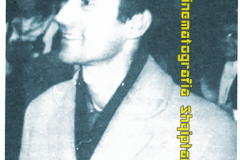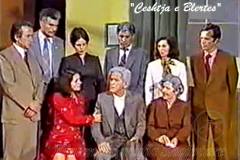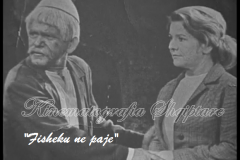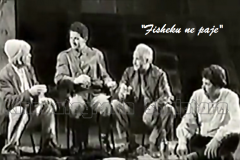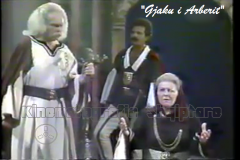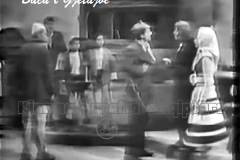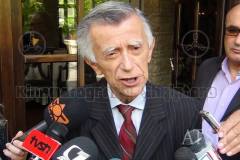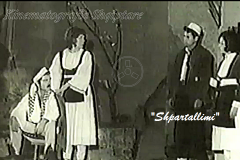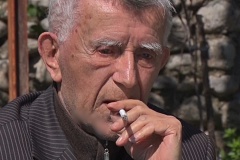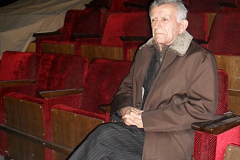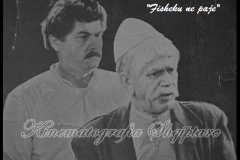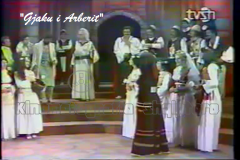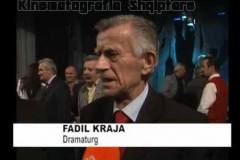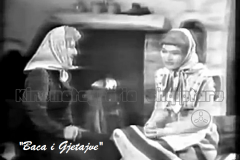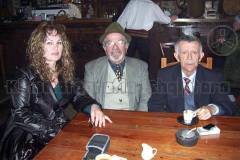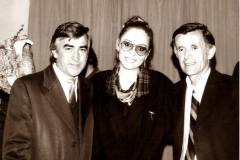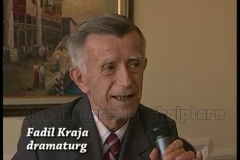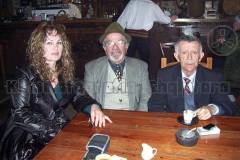Fadil Kraja (1931-2021)
Well-known playwright, writer and professor!
In a Shkodra hearth where culture and education were daily food, the future writer was born on October 18, 1931, who would have a multifaceted and qualitative creativity with nationwide values, especially in the field of dramaturgy, Fadil Kraja.
After finishing High School in Shkodra, where his talent for literature stood out, he graduated from the University of Tirana in the faculty of philology, language and literature, and passionately continued the teaching profession which he inherited from his family. In 1950, he started working for the first time as a teacher in the village of Mjedë in the house of Hasan Meti, since at that time there was no school in this village. The lesson there started with about 50 students from 8 villages: Shelqet, Spathar, Laç, Qyrsaq, Hajmel, Ganjoll, Kaç, Naraç, with 4 teachers; Isak Ramadani, Fadil Kraja, Rifat Barbullushi, Gita Shani.
Prof. Fadil Kraja remembers about that time an interesting relationship between him and the great playwright Kolë Jakova: “It was not a coincidence, but a fact. On the 40th anniversary of the opening of the first school in the village of Mjedë, the founder of this school in 1935 (then primary) Kolë Jakova was invited to Elez Agie’s house in Vaun e Dejës and I, who opened the 7-year cycle for the first time in 1947 – and he continues with a smile – in this school, in this village, Kolë Jakova wrote his first play, in this village, in this school, I had the idea of becoming a playwright, which I later made a reality”.
For many years he worked as a literature teacher in secondary schools and later as a lecturer of foreign literature at the Faculty of Language and Literature of the “Luigj Gurakuqi” University – Shkoder.
From 1972 to 1992, freelance writer, continuing as an external lecturer at the faculty and at the same time Chairman of the Shkodra Branch of the League of Writers and Artists. The first poetic volume “My Song” (1954) won the first prize in the National Literature Competition. Then he repeatedly published the poetic volumes “Melodi malesore”, “Echoes of the mountains”, the volumes with stories “The last candidate”….
For some time, he directed the Youth Club and later a permanent member of the artistic council at the “Migjeni” Theater. He is the author of over 50 dramas and comedies shown in all the professional theaters of Albania as well as in Kosovo, Montenegro, Macedonia and in the diaspora, where we can single out: “Cartridge in the dowry”, “Blood of Arbër”, “Signals of the night”, “Baca i Gjetajve”, “Good boys”, “The Case of Blerta”, “Shpartallimi”, “When hearts speak”, “Family matter”, “Flag at the wedding”, “Rozafa”, “Luani of house”, “Don’t leave me the sun’s shade”, “The Quilt”, “Diary of a teacher”, “Double six”, as well as many dramas for children, librettos of operas and operettas.
In his dramas sharp social and political conflicts are reflected, usually under the guise of moral contradictions, especially the usual ones resulting from the inertia and backwardness of the old codes of life organization in tribes and isolated rural communities that bring serious consequences. dramatic and not infrequently even tragic, such as blood feuds, the violation of canonical norms, the humiliation of women, the denial of the right to choose in love and marriage. Likewise, in the plays of the professor, we can also find virtues, habits, moral values sublimated through the acts, behaviors and lives of simple but noble and patriotic people.
In 1967, he wrote his first play “Fisheku ne paje”, best built with a shocking subject, which appears as prehistory, this play which was performed over 250 times in different towns and villages in Albania. This drama strongly and civically stigmatizes the old canonical custom of conditional marriages and the threat of death, unlike that marriage in “Fisheku ne paje”, where the husband had the right to kill the wife if she opposed him. If only to protect her unchanging personality in the family.
In 1979 he wrote another drama “Baca i Gjetajve” notable for its dramatic tones in the acquisition and establishment of power between two antagonistic political groups during the National Liberation War. Even the drama “Shpartallimi” places the subject in the years of World War II, in a mountain family, interweaving the conflict that comes from blood feud, used as a means of division by the invaders, with the national conflict for the liberation of the country and the man himself. In 1981, he wrote another masterpiece entitled “Blood of Arber”, a pearl of Albanian dramaturgy. The subject taken from a ballad and Albanian myths is presented with a noticeable historical and national layering. This drama stands out for its magnificent, epic and heroic tableaus in the presentation of the ancient history of the Albanians, their national center of bravery and freedom wars, the protection of the lands and deeply of the spiritual identity.
Based on the moral concept of faith and the given word, this drama brings epic heroic lines, events and characters and a poetic veil in its dialogue. Fadil Kraja is the winner of dozens of awards in national competitions. He is the Laureate of the Republic Award, thus becoming a writer who has built his multi-faceted identity. Through his dramas, especially those of a mythical character, Kraja knows how to make a temporal connection from the past to the present, giving a vision into the future as well.
The playwright from Shkodran has also been awarded two of the biggest titles that a writer can receive. “Pride of the city” from the City Council and “Grand Master” from the President of the Republic. “If there wasn’t a Fadil Kraja in the Albanian dramaturgy, then the drama in our country wouldn’t have these levels”. This is what is said in one of the literature texts at the Universities. In fact, Fadil Kraja is one of the brightest pens of Our national dramatist. But the dramas are not the only part of Fadil Kraje’s creativity. He is also a storyteller. “Silence that kills the soul” are two of his short stories. also in the novel genre. “Scream of a woman” is his novel that was highly appreciated by critics. Similarly, Fadil Kraja successfully writes and publishes the works “L’aquila ferita” and “La gravidanza ferita” in Italian. in Rome and in Florence. Life changes on November 18, 2021.
Fadil Kraja’s literary creativity.
My poem. Mountain melody; Echoes of the mountains; Shadows of the past; The events of Nereida; Falling mace; The last candidate; “Besa” was to blame; The silence that kills your soul; Aquila ferita; La gravidanza ferita; A Woman’s Scream (novel)
Drama and comedy Bullet in the dowry; “Shpartallimi”; “Baca i Gjetajve”; The Love of Our Lands; Two Dramas; “Luani of the House”; The Last Night; The Quilt; The Blood of Arber; The Night Signals; The Case of Blerta; Good Boys; The End of a comedy; Flag at the wedding; When the hearts are speaking;
He also masterfully wrote dramas for children, librettos of operas and operettas, etc.
Prof. Fadil Kraja passed away on November 18, 2021, at the age of 90!
________________________
Previously published on the Facebook page – Albanian Cinematography in October 2016 and revised in the following years.
Reference; “On the web” various Albanian portals “Tirana Observer” (2014) / “History and poetics of Albanian drama” (1886-1996) University of Prishtina, Faculty of Arts, Art Center, ARTC Prishtina 2003 volume 1p. 201-203 and 206-208 / Kraja Fadil. “From the initiative to the performance, Teater – no. 4 1979/ p. 43-48 / Mejit Preci “Alternative optics on drama, Logoreci. Tirana 2000 / p.91-96 / “Encyclopedia, Albanian Theater and Cinematography” – Toena 2009 / p.241-242.
Follow us: Blog: https://albaniancinematography.blogspot.com/ Vimeo: Albanian Cinematography (vimeo.com) Facebook: https://www.facebook.com/ksh.faqjazyrtare Dailymotion: https://www.dailymotion.com/kinetografiashqiptareartisporti YouTube: https://www.youtube.com/channel/UCDRYQ5xCyGkfELm3mX8Rhtw
Discover more from Albanian Cinematography - Sport
Subscribe to get the latest posts sent to your email.

